Towards pan-european regulation
The European Commission’s proposal for a Regulation on the European Health Data Space (EHDS) advanced to trilogue negotiations at the end of 2023. One of the highlights of the past year for Findata and the Finnish research infrastructure as a whole was the Commission’s €2.5 million funding to Findata for the FinHITS project preparing the implementation of the EHDS.
The four-year FinHITS project will provide us with significant additional resources to develop secondary use services and enable Finland to join the European health data space.
International cooperation on secondary use of health data also continued in the TEHDAS project coordinated by Sitra and in the EHDS2 pilot, where we led the development of a pan-European application form.
As in previous years, international interest in Findata was reflected in numerous visits and requests for presentations. Finland is a pioneering country in health data, even by European standards.

The processing of applications accelerated over the last year, and we were able to clear the queues that had built up at the beginning of the year. We continued to improve our efficiency by automating manual steps and streamlining processes.
Johanna Seppänen, PhD, Director
One thousand applications milestone reached in May 2023
In its 3.5 years of operation, Findata has received around 1 200 applications. The number of new applications received last year was slightly up from 2022.
In particular, the demand for statistical data and non-structured textual data increased. In terms of customer segments, the share of private sector applicants increased and now accounts for about one third of all applicants.
The processing of applications accelerated over the last year, and we were able to clear the queues that had built up at the beginning of the year. We continued to improve our efficiency by automating manual steps and streamlining processes.
The number of datasets provided by Findata almost doubled
The number of data sets received and processed by Findata increased compared to previous years. In 2023, Findata delivered a complete set of data for a total of 167 projects.
During the year, we strengthened the resources of our data team through recruitment, the development of AI-based tools and the acquisition of additional expertise from our partner CSC, particularly in processing large volumes of text.
A greater variety of data could be extracted from Kanta services, which will ease the extraction burden on wellbeing services counties in the future.
Closer cooperation with data controllers
We started to visit the new wellbeing services counties that have started their activities. These visits will continue this year. We organised briefings on the secondary use of social and health data and training on data description in the wellbeing services counties. We continued our well-established bilateral meetings with other key data controllers.
Findata’s controller and customer collaboration groups met regularly to discuss common topics such as issues in the wellbeing services counties, application processing, secure processing environments and the EHDS.
We started a reciprocal pilot with data controllers to share the costs of additional work caused by extraction errors. The aim of this so called solidarity model is to reduce the workload caused by extraction errors and to minimise the costs for applicants.
Many thanks to controllers, customers and partners for their good cooperation! We have a strong basis to move forward towards common European practices!
Johanna Seppänen, PhD, Director

2023 in figures
Compared to last year, the number of applications increased by 10 percent and the number of decisions by 24 percent.
58% amendment applications
29% data permit applications
13% data requests
84% positive
15% lapsed
1 transfer of administrative matters
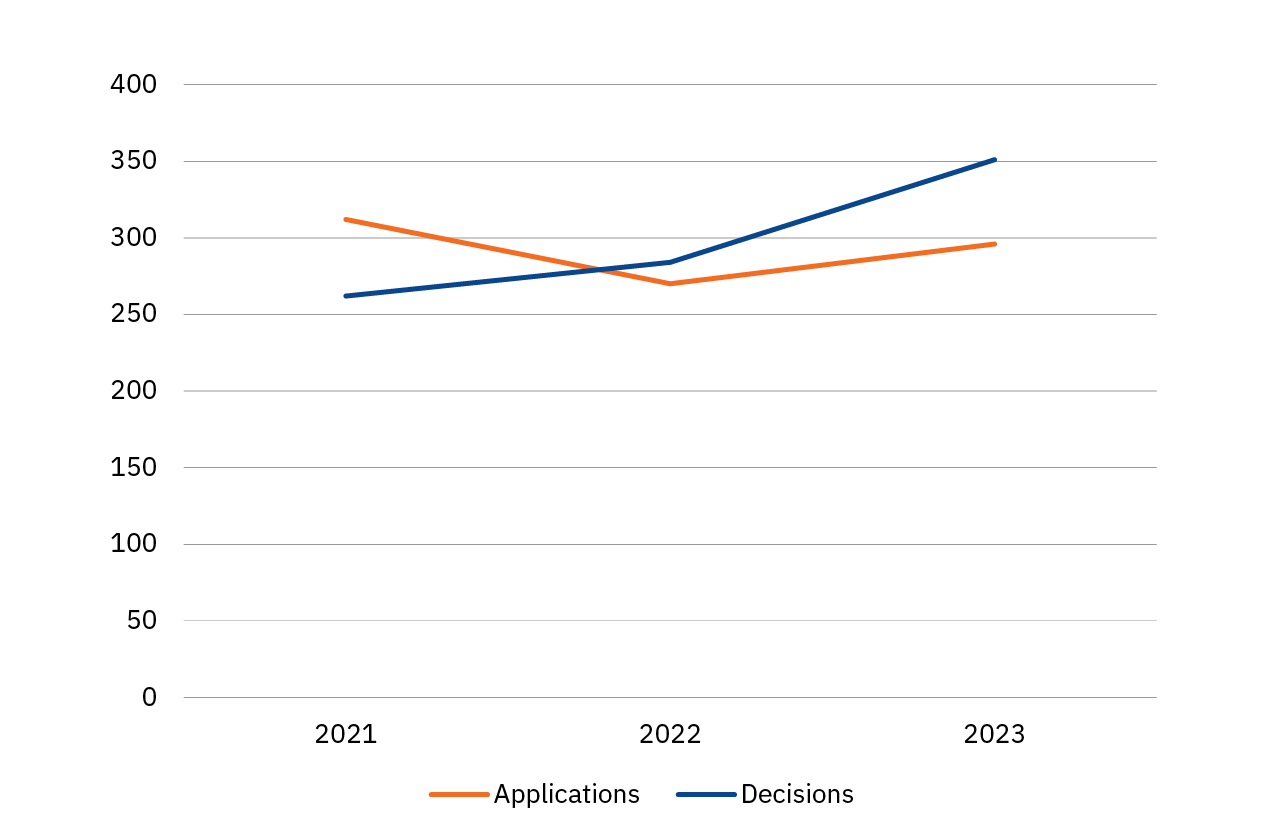
Processing times for data permit applications continued to vary widely, but the median time for processing dropped from 78 days at the beginning of the year to 72 days at the end of the year. Applications spent about a quarter of their processing time on Findata’s desk last year. The rest of the time the applications were waiting for information from the client or the controllers.
Most applications for amendment permits were processed very quickly, with a median processing time of 3 days.
Decisions by type of permit
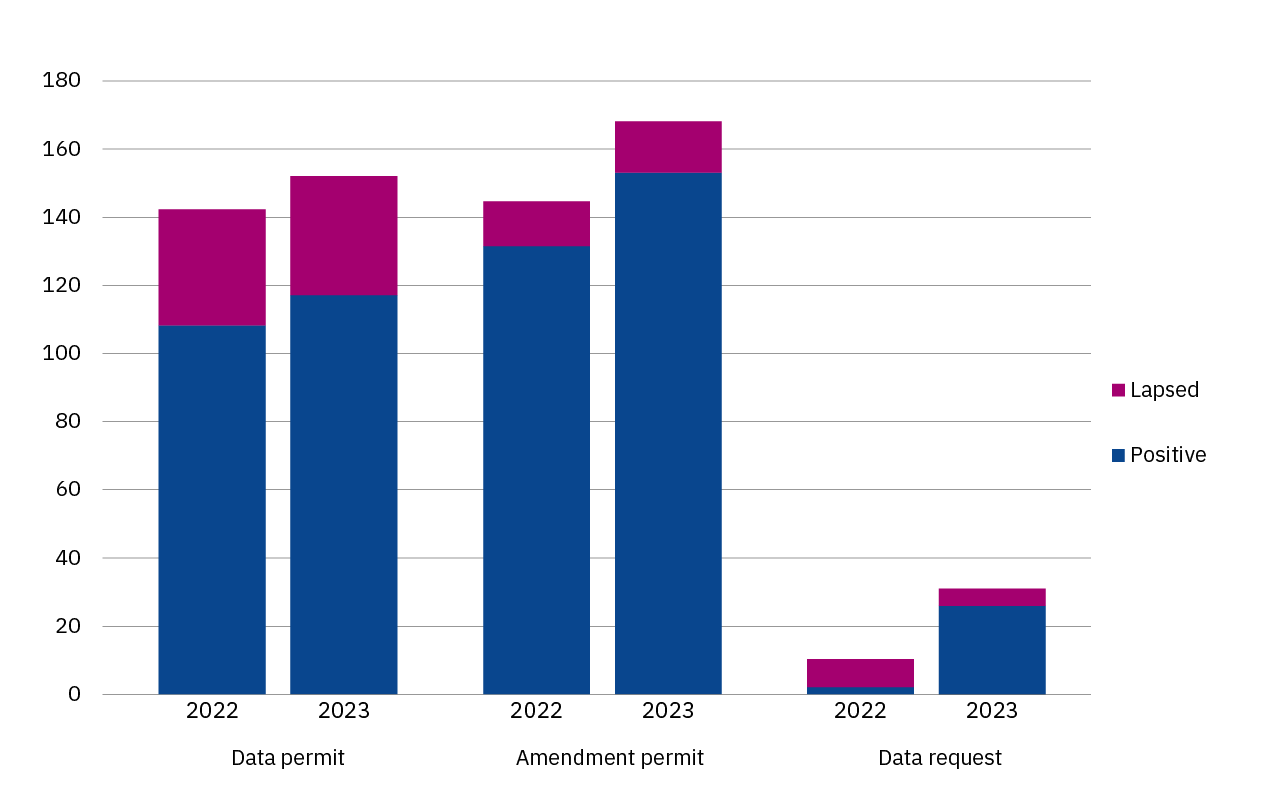
One data permit covered, on average, data from four different data controllers. One data permit covered in maximum data held by 15 controllers, while the minimum number of controllers included in one data permit was one. In total, we issued data permits for data held by 51 different controllers.
More than a half of the amendment decisions on data permits concerned changing the processors of personal data and just under a fifth concerned the extension of the validity of the permit. Around 15% of amendment decisions concerned the addition of data or an extension of the extraction period while around a tenth of the amendments concerned a change of processing environment. The rest concerned changes to controllers and the transfer of processing outside the EU/EEA countries.
The share of data requests reflects the increase in demand for statistical data. We made a total of 26 data request decisions, compared to only a few in previous years.
The centralisation of THL’s statistical data services in Findata was a major explanatory factor, but data provders serving wellbeing services counties, for example, also made use of the possibility to obtain pre-customised statistics.
The share of decisions subject to appeal continued to drop from 18% to 15%, compared with 33% in our first year of operation in 2020.
Purpose of use of the permits and data requests granted
The vast majority of the permits, 91%, were granted for scientific research.
An increase in the number of data request decisions raised the share of decisions granted for statistical purposes up to 7%.
As in previous years, only a few positive decisions were taken for other purposes.
No data permit or data request decisions were taken for education, guidance and supervision of a social and healthcare authority or knowledge management.
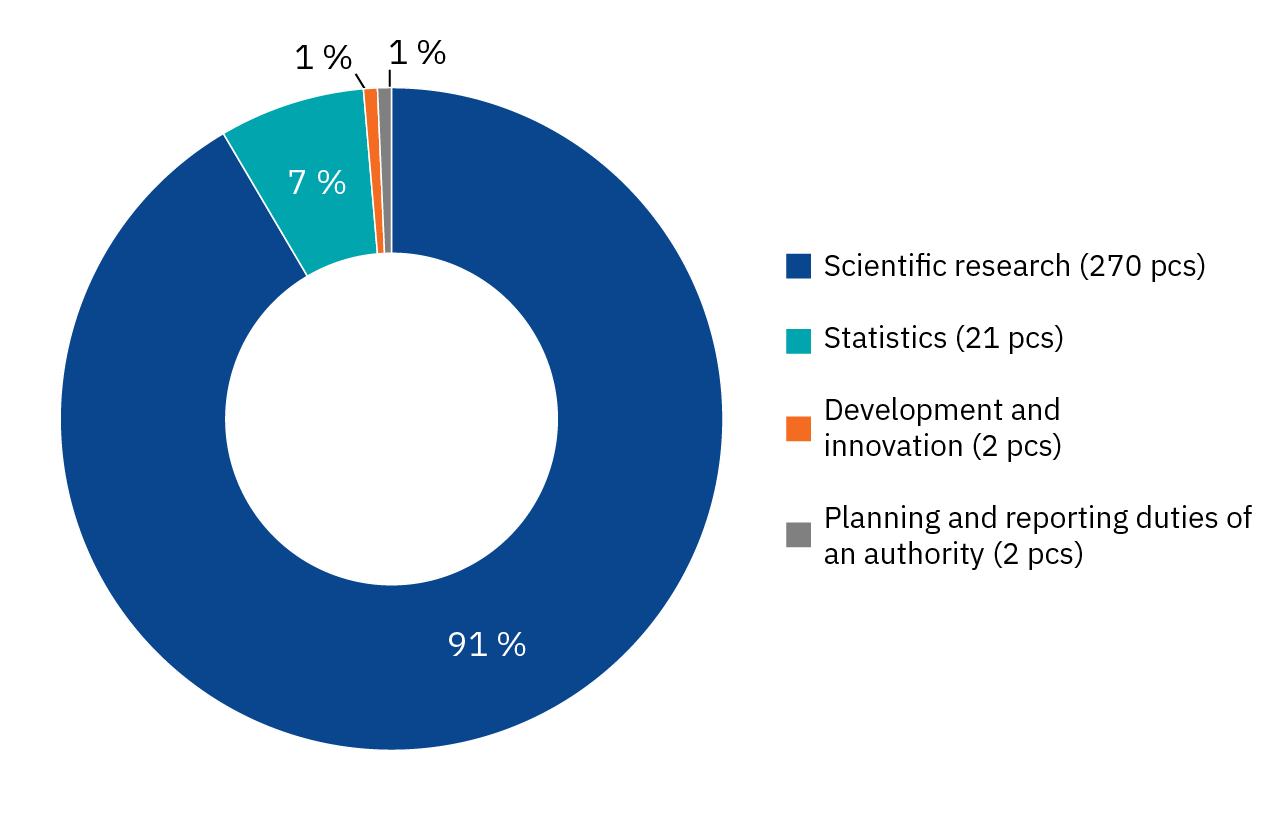
See all the permits granted by us and the permit holders here: Permits issued
Applicants and their backgrounds
Last year, the number of amendment applications increased from 47% to 58%, the number of data permit applications fell from 47% to 29% and the number of data request applications increased to 13%.
There were also changes in the applicants’ backgrounds. Applicants from the public sector held the top spot but were increasingly joined by applicants from the private sector.
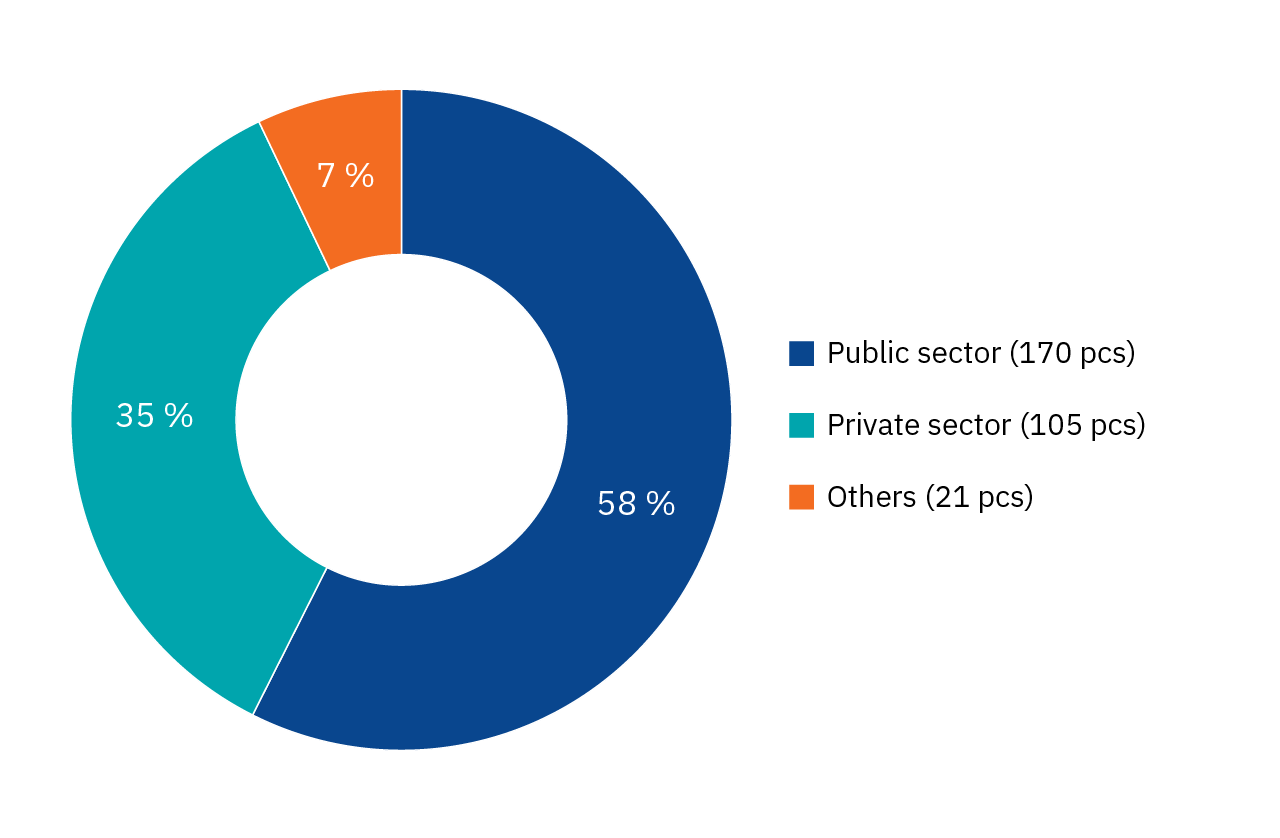
The public sector covered 58% of the applications submitted last year and the private sector 35%.
The ‘others’ category mainly comprises customers from the third sector and those who have requested data as private individuals.
We categorize the background of the applicants according to the main applicant. Some of the permits have been granted to projects or consortia that involve not only the main applicant but also other sectors.
Controllers and organisations associated with the highest numbers of applications
In 2023, the demand was greatest for national registers. About 75 percent of the applications sought data from the registers of the three most popular controllers – Finnish Institute for Health and Welfare (THL), Kela and/or Statistics Finland.
The next most applied were the data of the Digital and Population Information Agency and the Finnish Centre for Pensions. The number of applications for data from Wellbeing Services Counties and Hospital District of Helsinki and Uusimaa was lower than in the previous year.
| Popularity | Controller | Number of applications 2021 | Number of applications 2022 | Number of applications 2023 |
|---|---|---|---|---|
| 1. | Finnish Institute for Health and Welfare (THL) | 113 | 110 | 116 |
| 2. | Kela | 66 | 76 | 61 |
| 3. | Statistics Finland | 51 | 64 | 45 |
| 4. | Digital and Population Information Agency (DVV) | 29 | 42 | 25 |
| 5. | Finnish Centre for Pensions (ETK) | 15 | 15 | 17 |
| 6. | HUS | 27 | 43 | 16 |
| 7. | The Wellbeing Services County of Southwest Finland | 27 | 33 | 14 |
| 8. | The Wellbeing Services County of Pirkanmaa | 14 | 28 | 12 |
| 9. | Cancer Society of Finland | 7 | 12 | 12 |
| 10. | The Wellbeing Services County of North Ostrobothnia | 8 | 23 | 9 |
Data sampling requests and deliveries
13 requests/week
14 sets/week
15 sets/week
Around 5 sets/package
The number of datasets almost doubled in 2023, when we delivered a dataset for a total of 167 projects. The increase in the quantity of data, combined with the demand for large textual data sets, led to a backlog in data processing in the beginning of the year, which was resolved by the autumn.
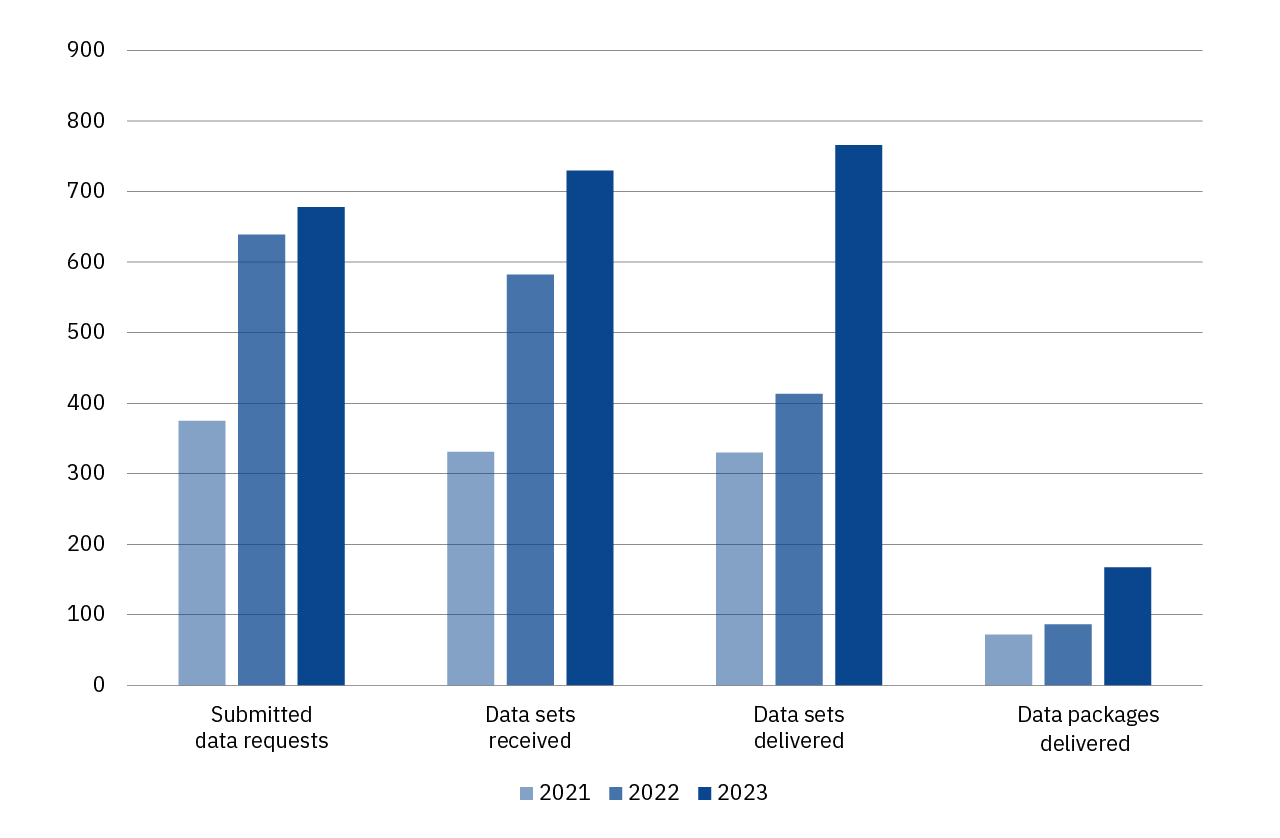
The volume of result data anonymity verifications continued to increase. In 2023, we verified the anonymity of clients’ results a total of 747 times, compared to 416 times in 2022.
In 81% of the verifications, the results were found to be acceptable as they were. In 19% of the cases, we found something to correct in the contents of the results, a slight increase from 13% the previous year. Most typically, the problems were related to the presentation of small frequency data.
As the amount of data sets increased, there were also more extraction errors than in previous years. We are working to reduce and streamline the handling of these errors through a joint pilot between Findata and the controllers and by adding a extraction checkpoint before data is extracted at the request of the applicant or the controller.
We continued to support the data description work by offering training to controllers and by developing tools, the Data editor and the Data catalogue.

Kapseli®
The number of Kapseli processing environments increased by 23 percent and the number of users 29 percent over the past year.
The number of Findata’s secure Kapseli processing environments continued growing.
There were 139 Kapseli’s in use at the end of 2023, with 1 073 registered users. The average number of users per one Kapseli has increased from five to eight in three years.
In addition to the most commonly used software, new services added to Kapseli last year include a Linux operating system and a storage service for storing data and program code.
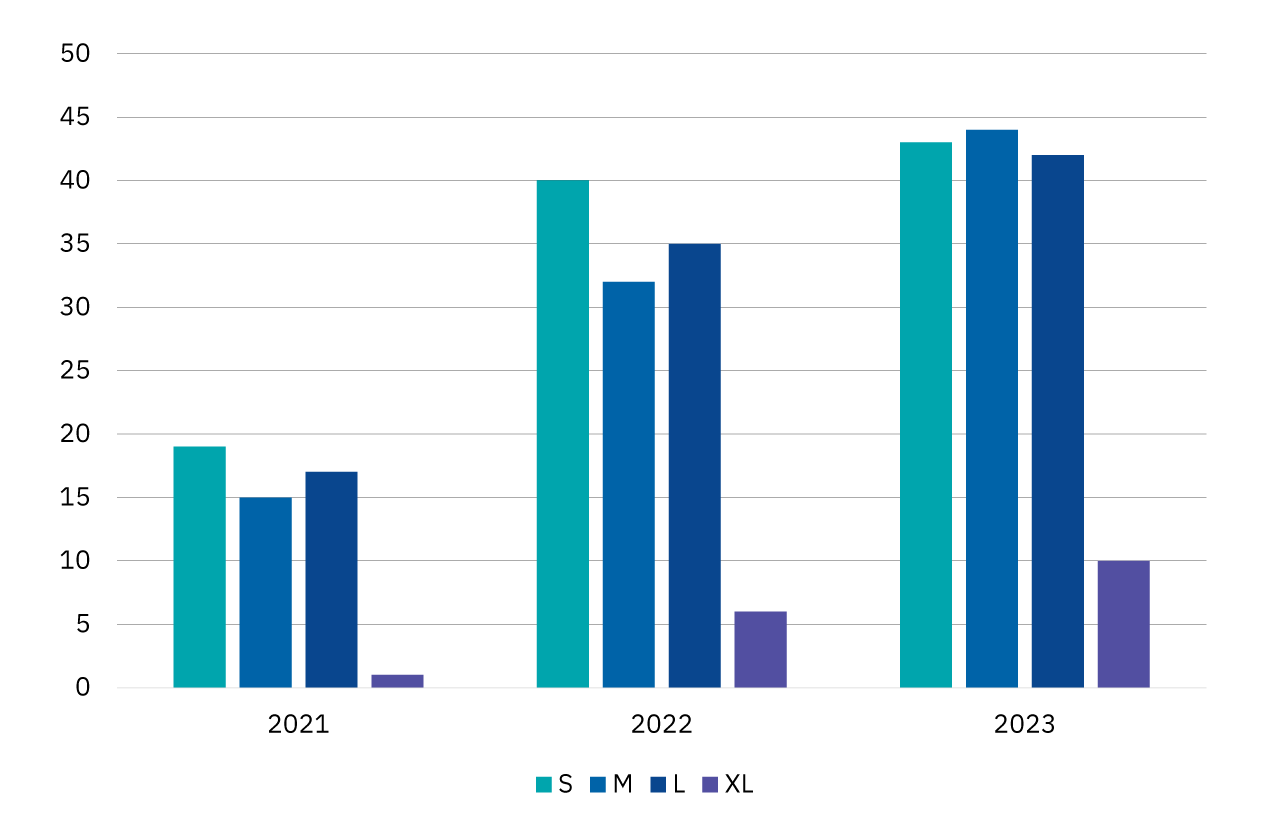
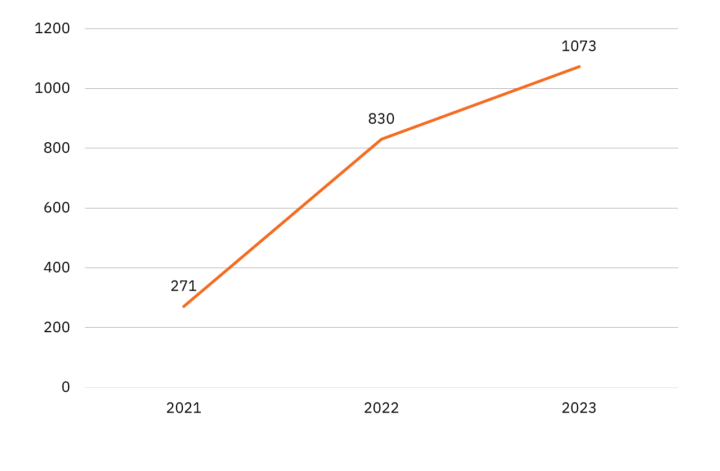

Distribution of costs
A total of approximately EUR 2 million was paid for the secondary use of social and health data through Findata in 2023.
Data processing EUR 411 000
+ EUR 316 000 compared to 2022
– EUR 69 000 compared to 2022
The figure includes Findata’s decision fees for new data permits, amendment permits and data requests, Findata’s data processing fees and extraction costs charged to customers by data controllers.
On average, 35% of the total invoice charged to customers consisted of Findata’s fees, such as decision fee and the cost of processing the data. The processing costs arise from combining data sets collected from controllers, pseudonymisation or anonymisation, and delivering the data to a secure processing environment.
Correspondingly, on average 65% of the total invoice consisted of data extraction costs charged by controllers to customers.
For the use of Kapseli, Findata’s customers paid a total of €371 000, which is €142 000 more than in 2022.
Findata’s decision and data processing fees and data controller’s extraction costs in 2023
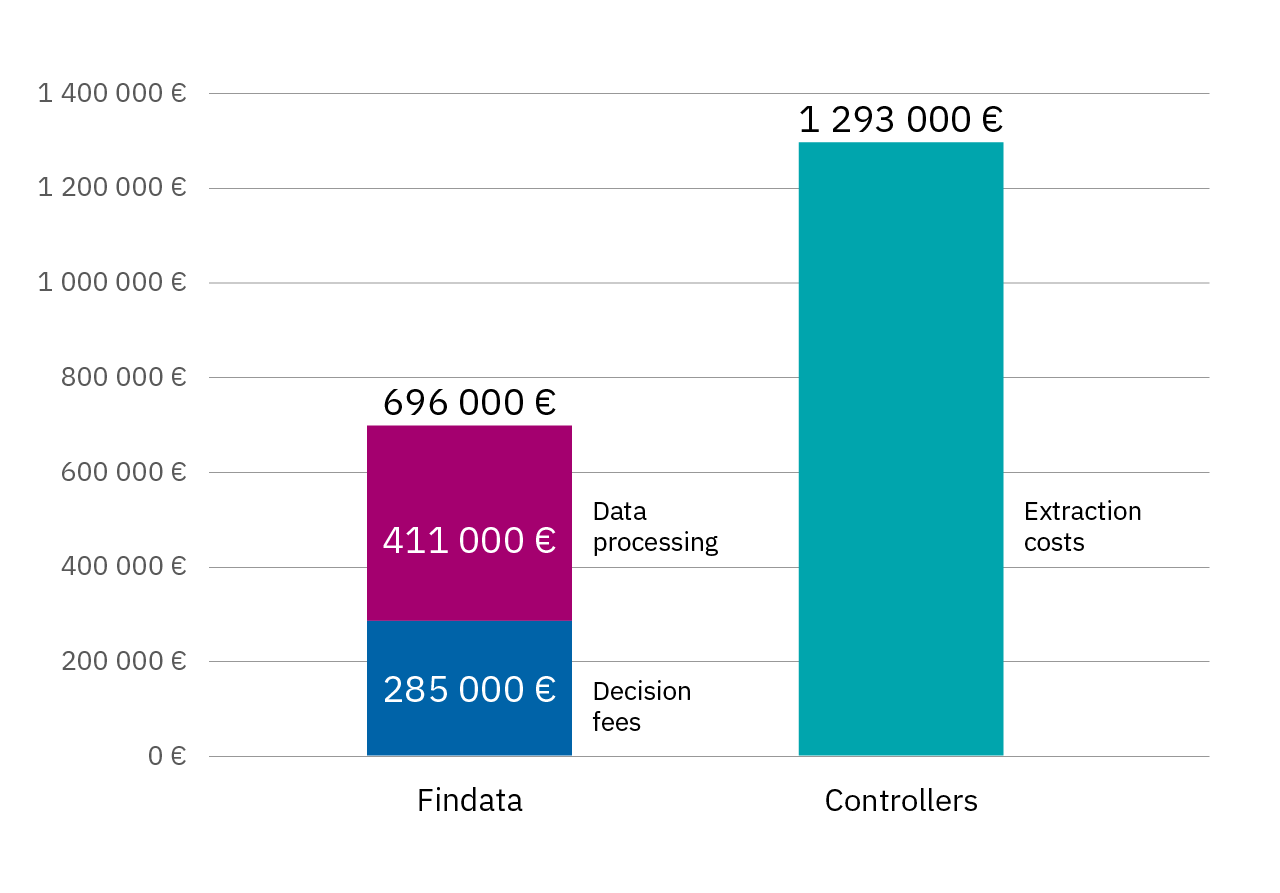
Top 10 most invoiced controllers in 2023
| Sija | Rekisterinpitäjä | Amount invoiced (EUR) | Invoiced extractions (pcs) |
|---|---|---|---|
| 1. | Kela | 332 100 | 116 |
| 2. | Finnish Institute for Health and Welfare (THL) | 221 100 | 176 |
| 3. | Digital and Population Information Agency (DVV) | 159 700 | 35 |
| 4. | HUS | 157 600 | 23 |
| 5. | The Wellbeing Services County of Southwest Finland | 125 700 | 21 |
| 6. | The Wellbeing Services County of Pirkanmaa | 43 900 | 7 |
| 7. | The Wellbeing Services County of North Ostrobothnia | 40 500 | 8 |
| 8. | Docrates Oy | 31 100 | 2 |
| 9. | Statistics Finland | 26 400 | 65 |
| 10. | Finnish Centre for Pensions | 24 700 | 18 |
| Total of 27 other controllers | 130 200 | 63 | |
| Total | 1 293 000 | 534 |

Communication and stakeholders
In 2023, we focused on clarity in our communication.
We revamped our customer application clinics and improved the way we communicate about our current queues on our front page. We also redesigned all our application forms and decision documents. All of these changes are designed to support our core mission and make our services easier to use.
We also continued to develop our website. Last year, the Regional State Administrative Agency for Southern Finland carried out a simplified accessibility audit of our website, which we used as a framework to make technical and content improvements to our website’s accessibility.
We simplified our instructions and provided a more comprehensive description of our privacy policy. We also updated the three different language versions of the site to make them more consistent.
Based on numerous requests for visits, speeches and events, Finland continues to be a target of international interest in the secondary use of social data. Cooperation with domestic stakeholders continued to be intensive in working groups set up by the Ministry of Social Affairs and Health and in more informal networks.
Events and presentations
Social media channels

Highlights of 2023

